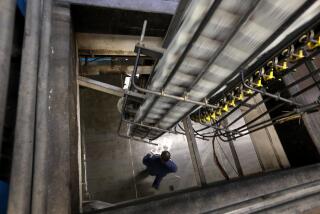Paper Props Cross the Line for Crew of One TV Show
- Share via
Like many TV shows about doctors, lawyers and cops, “Crossing Jordan” relies on Hollywood prop houses for stacks of official-looking documents to lend its sets a feeling of realistic clutter.
Last week, however, the show’s crew came across a box of prop papers that were a little too real for comfort.
The box held NBC hiring and personnel files on a number of the show’s employees. Included were home addresses and phone numbers, copies of Social Security cards and detailed medical histories.
The incident, which Glendale-based LCW Props said was likely a mistake, reveals a little-known showbiz fact: Many prop documents originate in the real world, but instead of heading for the shredder enjoy a second act in Tinseltown.
“These are very sensitive documents we’re talking about,” said Ray Holmgren, a driver on the show who said a number of his co-workers found their personal information in the stack on the set at Universal Studios. “Now, anybody in this industry who’s had problems with identity theft is going to say, ‘Hey, wait a minute.’ ”
In a prepared statement, NBC said it was looking into the matter.
“NBC has policies and procedures in place to protect the privacy of our employees, which is of utmost importance to us,” it said. “If a mistake occurred in this instance, we will take appropriate steps to address the situation.”
Mark Ringelberg, vice president of LCW Props, which supplied the box to the show, said it was probably an innocent mix-up.
Ringelberg said someone at NBC probably included the employment records by mistake with 30 boxes of prop documents that had been rented by the show “Boomtown” in July and returned to LCW in October.
Then the papers went out to “Crossing Jordan,” where a number of former “Boomtown” employees now work.
“It’s somebody putting the wrong box in the wrong place,” Ringelberg said.
But a variety of sensitive material ends up on Hollywood sound stages.
A recent sampling of “Crossing Jordan” prop documents included various legal documents, some 1996 personal medical records from a hospital in Redlands and the 1980s-era tax records of a couple in Reseda. Many contained Social Security numbers, bank account information and names and addresses of Southern California residents.
Experts say that kind of information is a potential gold mine for identity thieves, who victimized 7 million people in the U.S. during the 12-month period ending in May 2003. This marks an 80% increase over the previous year, said Avivah Litan, an identity-theft expert with the research firm Gartner Inc.
The increase is being fueled by widespread access to technology, such as the Internet, which crooks try to exploit to get personal information, Litan said. But the problem is exacerbated by the scant attention paid to piles of sensitive documents discarded by businesses and individuals.
The use of such documents on Hollywood sets, Litan said, “is a public display of how unconfidential sensitive information really is.”
TV show and film studio employees are not necessarily concerned that their documents will end up on film, because most dummy documents that are shown in a close-up are vetted by lawyers to ensure that the names on the papers are not those of real people.
Instead, they are worried about the easy access to sensitive documents that are stacked in the backgrounds of countless Hollywood sets -- on the desks of fake movie detectives, or in the static in-boxes of fake secretaries.
“We are an industry of make-believe,” said one “Crossing Jordan” employee who asked not to be named. “How hard would it be to make make-believe paper, to stuff in these files?”
The companies that supply Hollywood with such prop documents get the paper from a number of sources, from friends’ donated junk mail to their own in-house paper waste. Many of the documents are harmless, such as old memos and invoices.
LCW, which grew out of a family recycling business, gets much of its paper from defunct businesses and paper recycling companies.
Ringelberg said the company doesn’t screen the material for sensitive information. And in his eight-plus years in the prop business, he’s never heard a complaint until last week.
“What’s inside it? Who knows? Who cares?” he said. “When this stuff goes on movie sets, people don’t look through it.”
But some prop companies take precautions. Because Independent Studio Services of Sunland maintains 40 boxes of papers, compared with LCW’s 5,000, the company is able to screen documents for sensitive information, said Gregg H. Bilson, Jr., executive vice president.
Daril Alder, owner of Cinema Paper Rental in North Hollywood, said he doubts that his 500 boxes of documents pose much of a threat to anyone, but they are screened to some degree.
Ringelberg said the responsibility for destroying sensitive documents should rest with the companies that generate them.
And what about his company’s old documents? “We shred all of our stuff.”
More to Read
The biggest entertainment stories
Get our big stories about Hollywood, film, television, music, arts, culture and more right in your inbox as soon as they publish.
You may occasionally receive promotional content from the Los Angeles Times.










